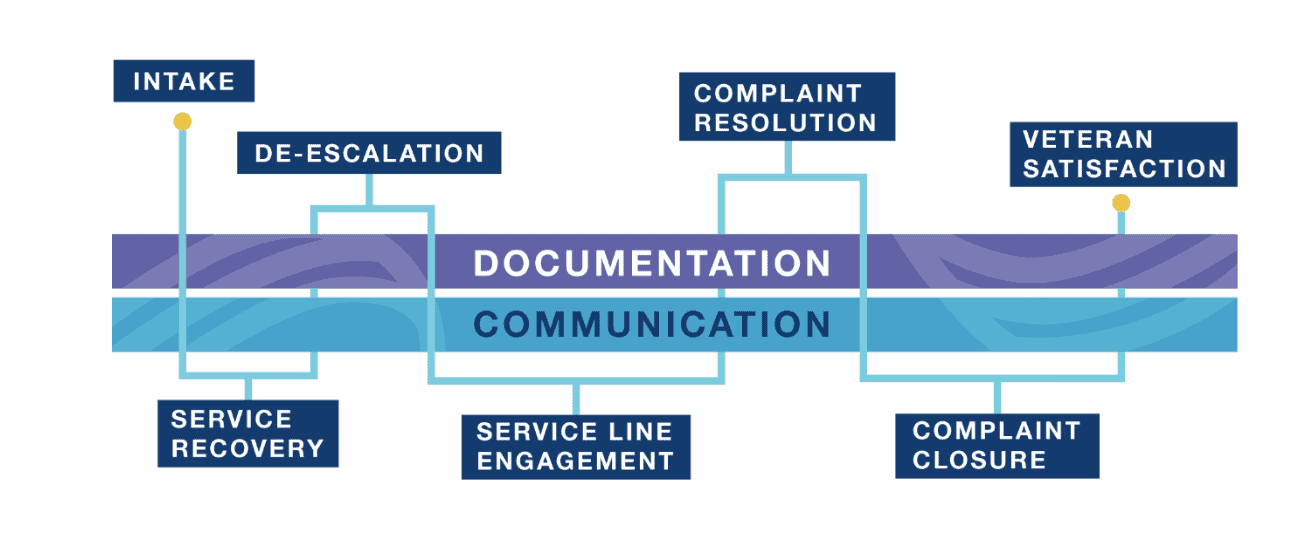Veteran-Centered Complaint Resolution: VHA’s Holistic Approach
Published January 19, 2023


Delivering Veteran-centered advocacy services to honor, advance, and influence the provision of healthcare to America’s Veteran is the mission of the Veteran Health Administration’s (VHA) Office of Patient Advocacy (OPA). Three key strategic drivers set by OPA in carrying out this mission are:
- PEOPLE: Increase the trust of our Veterans by providing world-class customer service through the Veteran-Centered Complaint Resolution holistic approach
- PROCESS: Analyze trends and evaluate opportunities to improve and provide guidance on the journey towards high reliability
- TECHNOLOGY: Modernize and maximize systems to provide accurate and trended patient data to leadership at all levels
OPA conducted a literature review and found that no comprehensive, step-by-step model for complaint resolution existed. OPA then established a diverse multidisciplinary Integrated Project Team of experienced healthcare and patient experience professionals to provide insights to identify, develop, and design a Veteran-Centered Complaint Resolution (VCCR) process. VCCR is VHA’s holistic approach to receive, identify, resolve, document, and communicate the resolution outcome to Veteran inquiries including compliments, complaints, and requests for information.
VCCR Model Defined

The VCCR model consists of seven core elements interconnected by two foundational pillars all critical to achieving a consistent, repeatable, and quality complaint resolution approach.
The following is a brief description of each component of VCCR:
- Intake: The first encounter or awareness of a complaint or inquiry that enables the organization to understand the ‘who, what, when and where’ the service gap occurred
- Service Recovery: The acknowledgement of the failure to meet customer service or experience expectations and agreeing to make amends for that failure
- De-escalation: The method or technique used to maintain a professional, neutral compassionate connection throughout the encounter
- Service Line Engagement: The commitment to recovery and resolution actions as close to the point of care as possible, including collaborating with patient advocates on systemic or complex complaints for full complaint resolution
- Complaint Resolution: The actions taken to resolve or determine the most appropriate course(s) of action and the stakeholders required to address the root cause of the complaint or service gap
- Veteran/Patient Satisfaction: The assessment to ensure the root cause of the complaint has been resolved and/or resolution options and outcomes are understood by the patient to the greatest extent possible
- Documentation: The systems and methods used to capture accurate, objective, and timely documentation at each step in the complaint resolution process supplemented with resolution approaches and attempts (the first VCCR pillar)
- Communication: The commitment to professional, transparent, consistent communication based on established realistic expectations (the second VCCR pillar)
The OPA launched a broad spectrum of resources and tools to support the VCCR deployment including a VCCR Guidebook; several Quick Reference Guides; Fact and FAQ sheets; a blend of web-based and instructor-led training modules; and focused discussion topics during Patient Advocate Communities of Practice. The majority (96%) of VHA’s Patient Advocates who completed the required training agree or strongly agree they will be able to apply the VCCR training knowledge and skills in their job and would recommend the training to others.
Collectively, Patient Advocates across VHA responded to over 750k inquiries with a notable 95% Veteran satisfaction rate in 2022.
OPA’s Executive Director met with senior leaders throughout the deployment of VCCR to garner the support necessary to establish and continue to build on this foundation of VHA Patient Advocacy competencies and programs. OPA’s Quality Improvement program analyzes and monitors complaint resolution documentation using key performance indicators to sustain the success and aid in the identification of any future improvement opportunities.
About the author:
Clarice Graham serves as the VCCR Senior Project Manager and leads the VHA Office of Patient Advocacy’s Organizational Development and Planning team. Graham is responsible for strategic planning, project management, data analytics, process reliability and operational support services. She holds a master’s degree in Health Administration and is a certified Lean Six Sigma Black Belt, Manager of Quality/Organizational Excellence, and a Certified Patient Experience Leader. Graham has dedicated over 17 years to serving our nation’s Veterans.
Related content
-
Patient Family & Community Engagement
Evaluating the Net Promoter Score to improve the emergency department patient experience in real-time
Published July 17, 2025

Northern Sydney Health District evaluated whether the Net Promoter Score (NPS) survey provided deeper insights of patient experience in the ED than an existing satisfaction survey. The study concluded that the NPS was statistically and clinically significant and is a recommended metric for measuring both patient satisfaction and experience in ED’s and other hospital settings.
Learn more -
Patient Family & Community Engagement
PFAC Series – Webinar/Panel: Starting a PFAC
Published September 26, 2025

Learn the foundational steps to create a strong and effective PFAC, from defining purpose and recruiting members to setting up structures for meaningful collaboration. Join us for a three-part interactive virtual series designed to help healthcare organizations start, strengthen, and sustain Patient and Family Advisory Councils (PFACs) that truly make an impact. Whether you are launching your
Learn more -
Patient Family & Community Engagement
Taking time and making space for patient and caregiver partners
Published August 8, 2025

Patient and caregiver engagement is a paramount element to ensure the voice of lived experience is integrated and prioritized in research. However, what it looks like to actually participate in authentic patient and caregiver engagement can be challenging without understanding the experience of our patient and caregiver partners. I had the honour of interviewing a
Learn more
